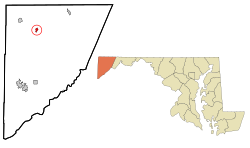Accident, Maryland
| Accident, Maryland | |
|---|---|
| Town | |

James Drane House in 2012
|
|
 Location of Accident, Maryland |
|
| Coordinates: 39°37′41″N 79°19′12″W / 39.62806°N 79.32000°WCoordinates: 39°37′41″N 79°19′12″W / 39.62806°N 79.32000°W | |
| Country | United States |
| State | Maryland |
| County | Garrett |
| Area | |
| • Total | 0.49 sq mi (1.27 km2) |
| • Land | 0.49 sq mi (1.27 km2) |
| • Water | 0 sq mi (0 km2) |
| Elevation | 2,385 ft (727 m) |
| Population (2010) | |
| • Total | 325 |
| • Estimate (2012) | 321 |
| • Density | 663.3/sq mi (256.1/km2) |
| • Demonym | Accidental |
| Time zone | Eastern (EST) (UTC-5) |
| • Summer (DST) | EDT (UTC-4) |
| ZIP code | 21520 |
| Area code(s) | 301 |
| FIPS code | 24-00225 |
| GNIS feature ID | 0582858 |
Accident (ˈæk.sə.dɛnt) is a town in Garrett County, Maryland, United States. The population was 325 at the 2010 census. The town is home to Northern Garrett High School. According to the book Labels for Locals by Paul Dickson, a person from Accident is called an "Accidental".
Accident, Garrett County, Maryland was one of the early settlements in the far west of Maryland.
When Lord Baltimore opened up the area he called Monocacy Manor to settlement in the early 1770s, Brooke Beall secured permission to survey 778 acres (3.15 km2). It will never be known for certain how Beall came to choose this particular spot, but the surveyor was given clear instructions where to start. He was to begin "in the center between two bounded white oak trees, standing on the North Side of the South fork of Bear Creek in or near a glade about one Hundred yards from said Run, about one or two Miles above a Lick known by the name of the "Cole Mine Lick", about four miles (6 km) above the mouth of Broad Creek and about one mile (1.6 km) East of a Ridge of the Negro Mountain." John Hanson, Jr., later a delegate to the Continental Congress, and President of the United States in Congress Assembled, on April 14, 1774, surveyed the land, finding that it only contained 682 acres (2.76 km2). For the next twelve years nothing was done with the survey. Revolution intervened, and it was not until February 15, 1786, that the land was granted by means of a patent to William Deakins. The following year the surrounding countryside was surveyed into military lots by Francis Deakins, lots that were meant as compensation for the soldiers who served from Maryland during the War of independence. Each soldier who served for two years received one lot of 50 acres (200,000 m2), officers received four lots of 50 acres (200,000 m2) each.
...
Wikipedia
